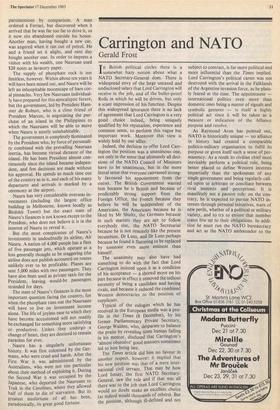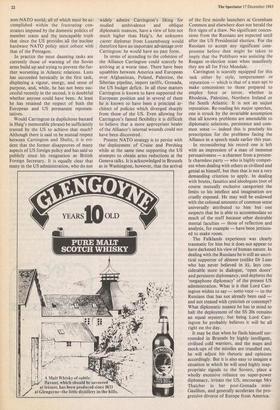Carrington and NATO
Gerald Frost.
I n British political circles there is a somewhat hazy notion about what a NATO Secretary-General does. There is widespread envy of the large untaxed and undisclosed salary that Lord Carrington will receive in the job, and of the bullet-proof Rolls in which he will be driven, but only a scant impression of his function. Despite this widespread ignorance there is no lack of agreement that Lord Carrington is a very good choice indeed, being uniquely qualified by his reputation, experience and common sense, to perform this vague but important work. Moreover this view is widely held by our allies.
Indeed, the decision to offer Lord Carr- ington the position was a unanimous one, not only in the sense that ultimately all deci-
sions of the NATO Council of Ministers have to be unanimous, but in the more literal sense that everyone canvassed strong- ly favoured his appointment from the outset. The British Government wanted him because he is British and because of predictably strong support from the Foreign Office, the French because they believe he will be independent of the Americans, the Americans because he is liked by Mr Shultz, the Germans because in such matters they are apt to follow everybody else, the NATO Secretariat because he is not remotely like the present incumbent, Dr Luns, and Dr Luns perhaps because he found it flattering to be replaced by someone even more eminent than himself.
The unanimity may also have had something to do with the fact that Lord Carrington insisted upon it as a condition of his acceptance — a shrewd move on his part because in effect it removed the tedious necessity of being a candidate and having rivals, and because it reduced the combined Western democracies to the position of supplicant.
Typical of the eulogies which he has received in the European media was a pro- file in the Times (8 December), by his former Parliamentary Private Secretary, George Walden, who, desparate to balance the praise by revealing some human failing in his mentor, disclosed that Carrington's `almost obsessive' good manners sometimes led to him being late.
The Times article did him no favour in another respect, however: it implied that his new position was that of a mere inter- national civil servant. That may be how Lord Ismay, the first NATO Secretary- General, saw the role and if that was all there was to the job then Lord Carrington would no doubt make an excellent choice (as indeed would thousands of others). But the position, although ill-defined and not subject to contract, is far more political and more influential than the Times implied. Lord Carrington's political career was not destroyed with the arrival in the Falklands of the Argentine invasion force, as he plain- ly feared at the time. The appointment international politics even more than domestic ones being a matter of signals and symbolic gestures — is itself a highly political act since it will be taken as a measure or indication of the Alliance purpose and resolve.
As Raymond Aron has pointed out, NATO is historically unique — no alliance in history had created a comparable politico-military organisation to fulfil its purpose or given itself such a sense of per- manency. As a result its civilian chief must inevitably perform a political role, being better placed to define Western interests impartially than the spokesman of any single government and being regularly call- ed upon to arbitrate or conciliate between rival interests and perceptions. It is manifestly not a passive role: on the con- trary, he is expected to pursue NATO in- terests through personal initiatives, warn of
new perils, whether of a political or military variety, and to try to ensure that member states live up to their obligations. In addi- tion he must run the NATO bureaucracy and act as the NATO ambassador to the non-NATO world; all of which must be ac- complished within the frustrating con- straints imposed by the domestic politics of member states and the inescapable truth that since the US provides all the nuclear hardware NATO policy must cohere with that of the Pentagon.
In practice the most daunting tasks are currently those of warning of the Soviet arms build up and trying to prevent the fur- ther worsening in Atlantic relations. Luns has succeeded heroically in the first task, displaying a vigour, energy, and sense of purpose, and, while, he has not been suc- cessful recently in the second, it is doubtful whether anyone could have been. At least he has retained the respect of both the European and US permanent represen- tatives.
Would Carrington (a duplicitous bastard in Haig's memorable phrase) be sufficiently trusted by the US to achieve that much? Although there is said to be mutual respect between Carrington and Shultz, it is evi- dent that the former disapproves of many aspects of US foreign policy and has said so publicly since his resignation as British Foreign Secretary. It is equally clear that many in the US administration, who do not widely admire Carrington's liking for studied ambivalence and oblique diplomatic nuances, have a view of him not much higher than Haig's. An unknown career diplomat from Luxembourg would therefore have an important advantage over Carrington: he would have no past form.
In terms of attending to the cohesion of the Alliance Carrington could scarcely be arriving at a worse time. There have been squabbles between America and European over Afghanistan, Poland, Palestine, the Siberian pipeline, import tariffs, Grenada, the US budget deficit. In all these matters Carrington is known to have supported the European position and in several of them he is known to have been a principal ar- chitect of policies which diverged sharply from those of the US. Even allowing for Carrington's famed flexibility it is difficult to believe that a more appropriate healer of the Alliance's internal wounds could not have been discovered.
Present NATO strategy is to persist with the deployment of Cruise and Pershing while at the same time supporting the US attempts to obtain arms reductions at the Geneva talks. It is acknowledged in Brussels as in Washington, however, that the arrival of the first missile launchers at Greenham Common and elsewhere does not herald the first signs of a thaw. No significant conces- sions from the Russians are expected until after the US Presidential election. For the Russians to accept any significant com- promise before then might be taken to imply that the Politburo was assisting the Reagan re-election team when manifestly they are all for Fritz Mondale.
Carrington is scarcely equipped for this task either by style, temperament or reputation — which is that of a man apt to make concessions to those prepared to employ force or terror, whether in Rhodesia, Palestine, Northern Ireland or the South Atlantic. It is not an unjust reputation. Re-reading his major speeches, one is struck by the invariable assumption that all known problems are amendable to diplomatic solutions, persistence and com- mon sense — indeed this is precisely his prescription for the problems facing the Alliance in a speech made earlier this year.
In reconsidering his record one is left with an impression of a man of immense persuasiveness — a charmer from a present- ly charmless party — who is highly compet- ent when dealing with others as civilised and genial as himself, but then that is not a very demanding criterion to apply. In dealing with brutes, fanatics and ideologues (not of course mutually exclusive categories) the limits to his intellect and imagination are cruelly exposed. He may well be endowed with the colossal amounts of common sense universally attributed to him but one suspects that he is able to accommodate so much of the stuff because other desirable mental faculties — those of reflection and analysis, for example — have been jettison- ed to make room.
The Falklands experience was clearly traumatic for him but it does not appear to have darkened his view of human nature. In dealing with the Russians he is still an uncri- tical supporter of detente (unlike Dr Luns who has never believed in it), lays con- siderable store in dialogue, 'open doors' and persistent diplomancy, and deplores the 'megaphone diplomacy' of the present US administration. What is it that Lord Carr- ington wishes to say — sotto voce — to the Russians that has not already been said and not treated with cynicism or contempt? What diplomatic nuance he has in mind to halt the deployment of the SS 20s remains an equal mystery, but being Lord Carr- ington he probably believes it will be all right on the day.
It may be that when he finds himself sur- rounded in Brussels by highly intelligent, civilised cold warriors, and the maps and mock-ups of the missiles are trundled out, he will adjust his rhetoric and opinions accordingly. But it is also easy to imagine a situation in which he will send highly inap- propriate signals to the Soviets, place a wholly excessive reliance on super-power diplomacy, irritate the US, encourage Mrs Thatcher in her post-Grenada mini- Gaullism, and generally accelerate the pro- gressive divorce of Europe from America.







































































 Previous page
Previous page